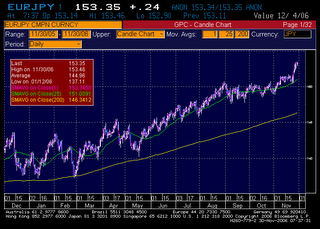
The market, according to pundits far and wide, ostensibly is focused on "interest rate differentials", and the forecasted rate of change thereof in the immediate period. Employing this line of reasoning, it would seem that the market is "acting rationally" eschewing Yen in favour of Euro's. In earlier days this might be wholly understandable since cycles might be distinctly out of phase. But globalization has changed this, increasing economic correlation and business cycle synchronization. Sure fiscal policies differ, and demographics might be divergent. But the logical question to ask is: Why might the European Central Bankers believe that 4% rate of interest is imminently appropriate, whilst the BoJapan's boffins (& MoFo's) believe 1% is too high?
Japanese asset prices are rising smartly - both property (commercial & residential)and shares. Corporate profits are surging. Capital investment increasing. Orders robust. Exports surging. Unemployment low. Government deficits large (>5%GDP). All the above are sure signs that things are pretty damn alright, irrespective of 0.5% core CPI still apparently deemed too low. Europe on the other hand, has less than 3% GDP fiscal deficits, much higher, but decreasing unemployment, surging asset markets, especially commercial and residential property (making some believe there is a bubble), growing private-sector debt, growing capex, roughly balanced trade accounts, and inflation that when incorporating asset prices, is growing and too high for policy makers to countenance.
So why with all this slack in employment, is inflation rearing up in Europe, but not Japan? Why are the Europeans more concerned about inflation or the Japanese with >5% fiscal gaps and near-ZIRP, not more puzzled by why with loose fiscal and loose monetary policy and rollicking asset markets, they are not generating more inflation at home? And if THAT combination of events is not generating goods-price inflation at home, would tighter monetary and fiscal policy really have a negative impact? And, if so, would this be bad for a nation that is is generating incredible dollops of income on overseas assets and FDI?
I think that what markets are not expressing, (rightfully since pissing in the wind is unpleasant in the best of times)) is that betting against the central bank and authorities of the world's second largest economy is a "mugs game". For the the world's central banks - at the moment - are working at different purposes. The US FRB is spinelessly schizo from dual irreconciliable mandates, erring on the side of soft money. The ECB is independently pursuing its mandate, it too erring on the side of soft money, though helped enormously by the saner fiscal policies, forward-thinking energy policy & taxes, and thankfully more balanced trade account, and manufacturing sectors. The BoJ, however, sits alone at the opposite pole to the ECB: politically compromised to TeamJapan, cynically selfish global citizen insofar as they maintain a ZIRP policy that matters not in the least to Japanese demand for credit, but which insures the YEN will be the global funding currency of choice to offset their surplusses and insure that TeamJapan losses not an iota of competitiveness to their Asian peers and would-be competitors. THAT is why the yen has deteriorated over the course of the past four years. THAT is why I loathe the BoJ's inaction, and the MoF's continued demaoguery regarding the impact of higher rates, for the only real impact of higher rates would be prevent the YEN from being the financing currency of choice for global carry, resulting in a higher Yen, resulting in lower corporate profits and potentially deflation of the benign adn unpernicious kind that results from productivity gains, plateuing demographics, and a geographical location adjacent to the largest deflationary force the world has ever seen.
China bears some blame here. For China, rather than be accumulating dollars, should be selling dollars and buying Yen, driving the Yen/Euro and Yen /dollar towards equilibruim amongst the crosses, and preparing for what the eventual acscent of the RMB (and the GCC currencies) relative to the entire OECD currency panpoly.




